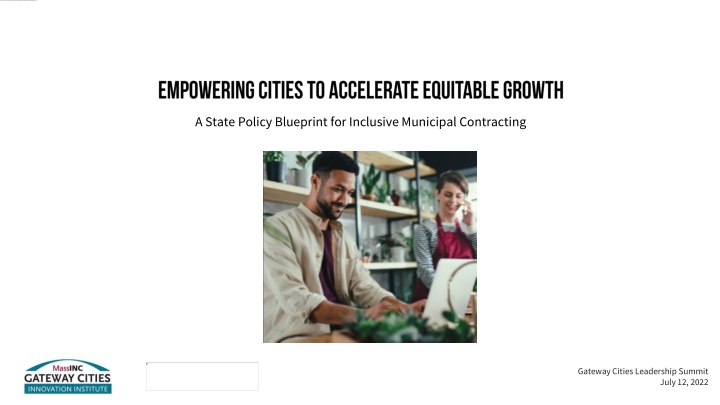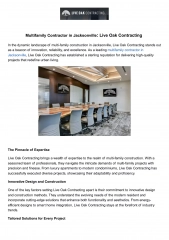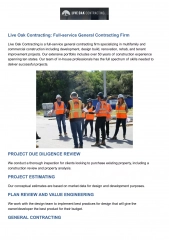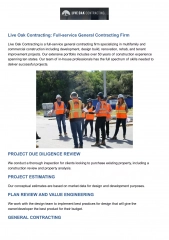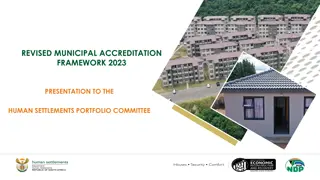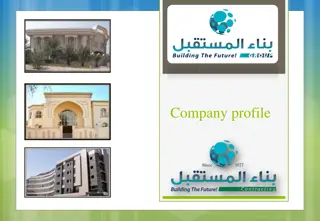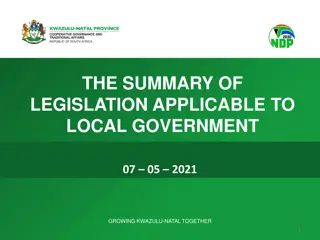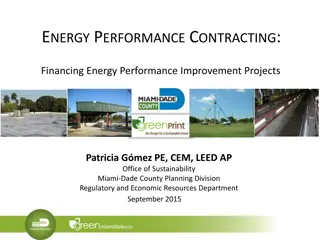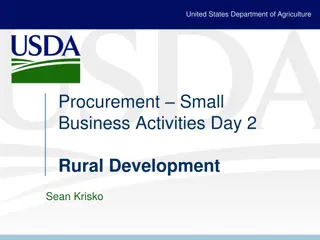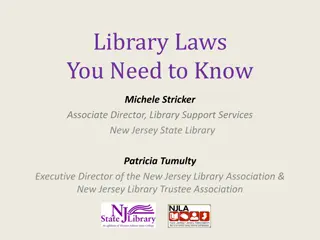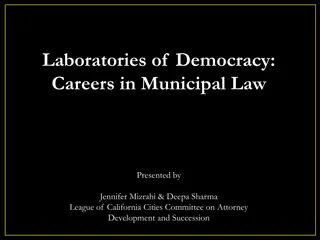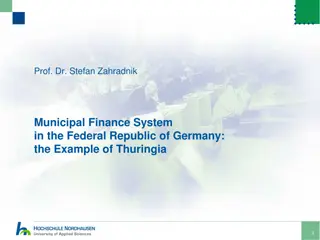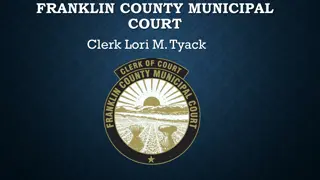A State Policy Blueprint for Inclusive Municipal Contracting
Cities nationwide focus on inclusive public contracting for economic growth, combatting inequality, and promoting local businesses. Analysis shows declining business formation in Massachusetts and disparities in business ownership. Significant federal funding through ARPA and BIL to support municipal construction projects.
Download Presentation

Please find below an Image/Link to download the presentation.
The content on the website is provided AS IS for your information and personal use only. It may not be sold, licensed, or shared on other websites without obtaining consent from the author.If you encounter any issues during the download, it is possible that the publisher has removed the file from their server.
You are allowed to download the files provided on this website for personal or commercial use, subject to the condition that they are used lawfully. All files are the property of their respective owners.
The content on the website is provided AS IS for your information and personal use only. It may not be sold, licensed, or shared on other websites without obtaining consent from the author.
E N D
Presentation Transcript
A State Policy Blueprint for Inclusive Municipal Contracting Gateway Cities Leadership Summit July 12, 2022
Cities across the country are focused on inclusive public contracting because it is smart economic policy. Combating inequality. Enhancing labor supply and productivity. Increasing the efficacy of government investment. Growing the number of small local businesses.
New business formation has declined sharply in Massachusetts. 300 Annual Number of New Companies in Massachusetts with Employees per 100,000 residents 250 200 150 -47% 100 50 0 2005 2006 2007 2008 2009 2010 2011 2012 2013 2014 2015 2016 2017 2018 Source: US Census, Business Formation Statistics
White residents in Massachusetts are still more than twice as likely to own a business. Share of Massachusetts workers self-employed in their own incorporated business 3.2% 1.7% 1.1% White Hispanic Black Source: Authors' analysis of 2020 ACS PUMS (five-year sample)
ARPA and BIL funding will send approximately $7 billion to MA cities and towns, more than 3X their typical annual capital spend. 1/3 of BIL, $3.1 $6.9 billion 1/3 of ARPA State, $1.8 ARPA Municipal, $2.0 $2.1 Typical Annual Municipal Construction Spending New Federal Funding Source: : Authors' estimates from US Census Bureau, 2019 Annual Surveys of State and Local Government Finances
Capital spending by municipalities in Massachusetts is largely schools and water and sewer construction. State and local construction expenditure by category, 2019 Transit and Utilities $1,411 $389 Highways $1,196 $339 K-12 Schools $1,089 State Local Sewerage $138 $356 Higher Education $488 Source: : US Census Bureau, 2019 Annual Surveys of State and Local Government Finances
Cities use a variety of contracting programs to increase supplier diversity. Enforceable sub-contracting goals Bid discounts Contact set asides or sheltered markets
These approaches can be race-conscious or race-neutral; a race- conscious approach will require a disparity study.
In Massachusetts, cities have some openings to advance inclusions with goods and services purchases. For contracts below $50,000, can ensure small or local businesses are among the bidders solicited For certain contracts above $50,000 awarded through an RFP process, some ability to consider Diversity, Equity, and Inclusion criteria. Small or local business program (Race-neutral) No sheltered market program possible under existing law For contracts below $10,000, can institute a sheltered market program, but only with a disparity study. For contracts below $50,000, can ensure MBEs are among the bidders solicited MBE program (Race-conscious) For certain contracts above $50,000 awarded through an RFP process, some ability to consider Diversity, Equity, and Inclusion criteria.
Our cities have more power to advance inclusion with public building construction and disposition of public property. For contracts below $50,000, can ensure small or local businesses are among the bidders solicited Small or local business program For RFPs for disposition of public property, some ability to consider Diversity, Equity, and Inclusion criteria. (Race-neutral) No sheltered market program possible under existing law No subcontracting equity program possible under existing law For contracts below $50,000, can ensure MBEs are among the bidders solicited For State-funded projects, requirement to meet the Commonwealth s MBE participation goals under the Affirmative Marketing Program (AMP) MBE program (Race-conscious) For RFPs for disposition of public property, some ability to consider Diversity, Equity, and Inclusion criteria. No sheltered market program or subcontracting equity program possible
Our cities have little power to advance inclusion with public works construction. For contracts below $50,000, can ensure small or local businesses are among the bidders solicited Small or local business program No sheltered market program possible under existing law (Race-neutral) No subcontracting equity program possible under existing law For contracts below $50,000, can ensure MBEs are among the bidders solicited No sheltered market program possible under existing law MBE program No subcontracting equity program possible under existing law (Race-conscious)
They do have considerable power to advance inclusion with design services. Considerable flexibility to ensure small or local business inclusion Small or local business program (Race-neutral) Municipal design projects that include state funding must incorporate MBE participation goals. MBE program (Race-conscious)
With targeted changes to state law, Massachusetts can empower municipalities to seize the opportunity. 1. Expand Massachusetts' existing sheltered market program to include public building and public works construction. 2. Expand the sheltered market program to include small and local businesses. 3. Create underutilized business provisions for public buildings and public works construction. 4. Confirm that unbundling large contracts is a permissible way to meet inclusive procurement goals. 5. Create a grant program to help municipalities collect and publicly report MBE participation in procurement.
